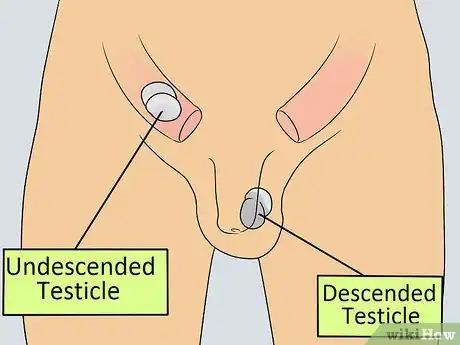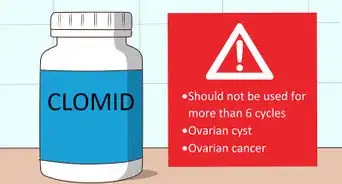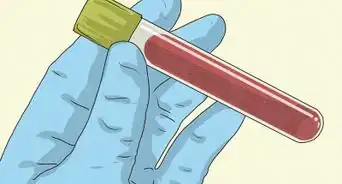This article was co-authored by Debra Minjarez, MS, MD. Dr. Debra Minjarez is a board certified Obstetrician & Gynecologist, Fertility Specialist, and the Co-Medical Director at Spring Fertility, a Fertility Clinic based in the San Francisco Bay Area. She has previously spent 15 years as the Medical Director of Colorado Center for Reproductive Medicine (CCRM) and has also worked as the Director of the Reproductive Endocrinology and Infertility at Kaiser Oakland. Throughout her professional life, she has earned awards such as the ACOG Ortho-McNeil Award, the Cecil H. and Ida Green Center for Reproductive Biology Sciences NIH Research Service Award, and the Society for Gynecologic Investigation President’s Presenter Award. Dr. Minjarez received her BS, MS, and MD from Stanford University, completed her residency at the University of Colorado, and completed her fellowship at the University of Texas Southwestern.
There are 16 references cited in this article, which can be found at the bottom of the page.
This article has been viewed 33,777 times.
It can be hard to recognize male infertility. A diagnosis of male infertility typically happens after testing of both partners and finding fertility trouble in the male.[1] Out of every five infertile couples, one couple will experience reproductive problems as a result of male infertility.[2] Male infertility may have genetic causes or may be caused by things like drug abuse, infections, and excessive exposure of the testicles to heat.[3] To figure out whether you have male infertility, you should look at your risk factors, examine your physical condition and ask your doctor about fertility testing options.
Steps
Recognizing Physical Symptoms of Male Infertility
-
1Understand that male infertility often has no obvious signs. Many infertile men experience a regular sex life and have sperm that looks fine to the naked eye.[4] In this sense, it is difficult to recognize the physical symptoms of male infertility. Warning signs are rare, but some infertile men have lumps or swelling near the testicles, breast growth, erectile dysfunction, and respiratory problems.[5]
-
2Feel for a lump or swelling in your testicles. A lump, swelling or pain and discomfort in your testicles can be a symptom of male infertility.
- Examine your testicles while standing in front of a mirror. Hold your right testicle with your hand and your thumb on top. Roll it gently and feel for any pain or discomfort. Next, hold your left testicle and roll it gently to feel for any pain or discomfort. Do not worry if one testicle feels slightly larger than the other one, since this is perfectly normal.[6]
- If you feel any pain or a heaviness in your groin, you should see a doctor.[7]
-
3Inspect your breasts to see if they have grown excessively. If you have grown very large breasts (known as gynecomastia), you may be experiencing a symptom of male infertility.
- Talk to your doctor if you have large breasts. Gynecomastia is often confused with just having fatty breast tissue, so you should ask your doctor to look at your breasts. Your doctor may check for breast cancer or an infection of the breast tissue called mastitis.[8]
-
4Look at your body and facial hair. One symptom of male infertility is a decrease in body hair, which can be a sign of a hormonal imbalance. If you have significantly less hair growth than normal, you may be experiencing a symptom of male infertility.
-
5Consider whether you have difficulty maintaining an erection. Erectile dysfunction can also be a cause of male infertility.[9] In this case, you should ask your doctor about treatments for erectile dysfunction.
- Common treatments for erectile dysfunction include sildenafil (Viagra), tadalafil (Cialis), avanafil (Stendra), and vardenafil (Levitra, Staxyn). These types of medications help your body increase blood flow to the penis. However, you should see your doctor for full treatment options and approval of any medication. In particular, the above treatments are dangerous for people with low blood pressure, liver or kidney disease.[10]
-
6See whether you have respiratory problems or infections. Another symptom associated with male infertility is respiratory problems. If you have trouble breathing or have had a lot of respiratory infections, you may have a condition associated with male infertility.[11]
Testing for Male Infertility
-
1Test your sperm count. Approximately two-thirds of men who experience infertility have difficulty with sperm production. Difficulties with sperm production include not only how many sperm are produced but also the quality of the sperm.[12] In terms of quantity, ejaculating less than 15 million sperm per milliliter of semen is considered a low sperm count. If you suspect you may have a low sperm count, you should ask your doctor about getting your sperm count tested.[13] You could also do a home sperm test.
- Do a sperm test at home. You can purchase a home sperm test online or at major drug and department stores. Typically, these home sperm tests are reasonably accurate in measuring sperm count. You will have to ejaculate into a cup, wait ten minutes, and then look for your results.[14]
- Remember that home sperm tests are limited in their ability to test for male infertility. They only measure sperm count and do not check for things like motility, shape, and other aspects of sperm quality.[15]
-
2Check to see if your medical insurance plan covers infertility tests. Although many plans cover the diagnostic tests needed to determine infertility, there can be complications. You should check with your insurance plan to see if they cover the infertility tests you want to take.[16]
- Some plans cover the diagnosis of infertility but not the treatment. You should also see whether or not your plan covers infertility treatment.
- Check to see if there are age and gender related restrictions in your plan.
-
3Ask your doctor to test for male infertility. Your doctor will likely conduct a physical examination and look at your medical and sexual history. The next step will likely involve an analysis of your semen. You will have to masturbate into a cup and they will send the sample to the laboratory for sperm count testing.[17]
- Be honest with your doctor about your lifestyle, including your diet, exercise, alcohol intake, and any substance abuse.[18]
- If the sperm analysis is not sufficient to determine infertility, your doctor may do a scrotal ultrasound test. This test is used to look for problems such as varicocele (varicose veins in the scrotum).[19]
- Get hormone testing to see if there is a problem with testosterone.[20]
- Get a post-ejaculation urinalysis. This test is used to determine if your sperm are travelling in the wrong direction and ending up in your bladder.[21]
- Look into genetic tests. If the sperm analysis finds a very low count, you can get genetic testing done to see if your condition is inherited.[22]
- A testicular biopsy may be conducted in unusual circumstances. This test can determine whether the problem lies with sperm production or transport.[23]
-
4See an infertility specialist to check for male infertility. If you have been trying to conceive for over a year and have not been able to determine the problem with your regular doctor, you may want to see a specialist. An infertility specialist can explore your infertility problem in detail and order targeted testing as needed.[24]
Figuring Out if You Are At-Risk of Male Infertility
-
1Look over your medical history. In particular, check to see if you have a history of medical problems with your reproductive organs. If you have had surgery in the scrotum area, you should mention this to your doctor as you discuss fertility.[25]
-
2Figure out whether you have been around toxins at work. Consider whether you have been exposed to a lot of environmental toxins. Lead, pesticides and other environmental toxins may increase your risk of infertility.[26]
-
3
-
4Note if you have an undescended testicle. This is a testicle that is not suspended below your body.[29] If you have this condition, you will have only one testicle. Your doctor can examine you and find out more.
-
5Look at your medical history of chemotherapy and radiation. If you have had cancer and were treated with chemotherapy or radiation, you may be at an increased risk for infertility.[30]
-
6Evaluate whether you have experienced overheated testicles. If you regularly use a sauna, soak in a hot bath or wear very tight clothing, you may be overheating your testicles. This can lead to an increased risk of male infertility.[31]
References
- ↑ https://www.healthymale.org.au/mens-health/male-infertility
- ↑ https://www.healthymale.org.au/mens-health/male-infertility
- ↑ http://www.hsadeghi.com/male-infertility
- ↑ https://www.healthymale.org.au/mens-health/male-infertility
- ↑ https://my.clevelandclinic.org/health/diseases/17201-male-infertility
- ↑ http://tcrc.acor.org/tcexam.html
- ↑ http://tcrc.acor.org/tcexam.html
- ↑ https://www.nhs.uk/conditions/mastitis/
- ↑ https://www.healthymale.org.au/mens-health/male-infertility
- ↑ https://www.urologyhealth.org/urology-a-z/e/erectile-dysfunction-%28ed%29
- ↑ https://www.pnas.org/doi/abs/10.1073/pnas.0604641103
- ↑ https://www.healthymale.org.au/mens-health/male-infertility
- ↑ https://my.clevelandclinic.org/health/diagnostics/21520-semen-analysis
- ↑ https://my.clevelandclinic.org/health/diagnostics/21520-semen-analysis
- ↑ https://my.clevelandclinic.org/health/diagnostics/21520-semen-analysis
- ↑ http://www.advancedfertility.com/ivf-insurance.htm
- ↑ http://www.mayoclinic.org/diseases-conditions/male-infertility/basics/tests-diagnosis/con-20033113
- ↑ Debra Minjarez, MS, MD. Board Certified Reproductive Endocrinologist & Infertility Specialist. Expert Interview. 31 March 2020.
- ↑ http://www.mayoclinic.org/diseases-conditions/male-infertility/basics/tests-diagnosis/con-20033113
- ↑ http://www.mayoclinic.org/diseases-conditions/male-infertility/basics/tests-diagnosis/con-20033113
- ↑ http://www.mayoclinic.org/diseases-conditions/male-infertility/basics/tests-diagnosis/con-20033113
- ↑ http://www.mayoclinic.org/diseases-conditions/male-infertility/basics/tests-diagnosis/con-20033113
- ↑ http://www.mayoclinic.org/diseases-conditions/male-infertility/basics/tests-diagnosis/con-20033113
- ↑ http://www.mayoclinic.org/diseases-conditions/low-sperm-count/expert-answers/home-sperm-test/faq-20057836
- ↑ http://www.mayoclinic.org/diseases-conditions/male-infertility/basics/symptoms/con-20033113
- ↑ https://www.plannedparenthood.org/learn/men/male-infertility
- ↑ https://www.plannedparenthood.org/learn/men/male-infertility
- ↑ http://www.hsadeghi.com/male-infertility
- ↑ https://www.plannedparenthood.org/learn/men/male-infertility
- ↑ https://www.plannedparenthood.org/learn/men/male-infertility
- ↑ https://www.plannedparenthood.org/learn/men/male-infertility
- ↑ https://www.ncbi.nlm.nih.gov/pubmed/2480471
- ↑ http://www.hsadeghi.com/male-infertility









































































Medical Disclaimer
The content of this article is not intended to be a substitute for professional medical advice, examination, diagnosis, or treatment. You should always contact your doctor or other qualified healthcare professional before starting, changing, or stopping any kind of health treatment.
Read More...